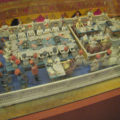I heard about the 7/7 bombs from my dad, who called to let us know that my daughter and her boyfriend, visiting them in England, were safely at home in Milton Keynes, though they had all been touristing in London the day before.
I checked in with various friends; everyone’s okay. Life in London returned to normal the next day, with detours to place flowers at the bombing sites. Londoners have survived worse. Some still remember the Blitz in WWII, and most remember the years of IRA terrorism.
Israelis, of course, were unfazed by the news. It seems that everyone in Israel has lost a friend or loved one to terrorist bombs, or has their own near-miss story. The Israelis learned long ago how to cope with “everyday” terror, including such frighteningly hard-headed strategies as putting one’s children on separate buses to school.
In Italy, there had already been a noticeable police presence in railway stations, and sometimes on the trains, reminding us that we’re under siege. The Italian police forces had not been idle, but they increased their efforts after the London bombings, and arrested or expelled from the country dozens of people considered dangerous. Government officials have publicly stated that Italy is, nonetheless, at considerable risk. One even said specifically that they’re expecting something to happen in February, though he did not elaborate on the reasoning behind this prediction. The timing seems to be related to next spring’s elections, on the assumption that, since the Madrid bombing changed the Spanish government and led directly to the withdrawal of Spanish troops from Iraq, the same logic might be applied to Italy (thanks, Spain).
France and the Netherlands have temporarily suspended the Schengen accords (which allow free movement across borders) and are checking everybody entering and leaving. I’m not sure how useful this is. The London terrorists were home-grown, and France and the Netherlands have their own disaffected Muslims; it would be more useful to look harder at people already in the country. Though it seems that the masterminds and instructors of the London bombings may have been foreigners; I guess we don’t want the same guys personally spreading their cheer in other countries.
What does all this imply for everyday life in Italy? I commute to Milan almost every weekday, by train. I suppose I should be worried… Nah. Life’s too short, and, anyway, what am I going to do? Barricade myself in my house? That would truly be a victory for the terrorists. The best thing I can do is spit in their eye, metaphorically, by continuing to do what I do and be what I be. Most of my lifestyle is an affront to the beliefs of these idiots. That’s my personal freedom, and I am not about to give it up.






